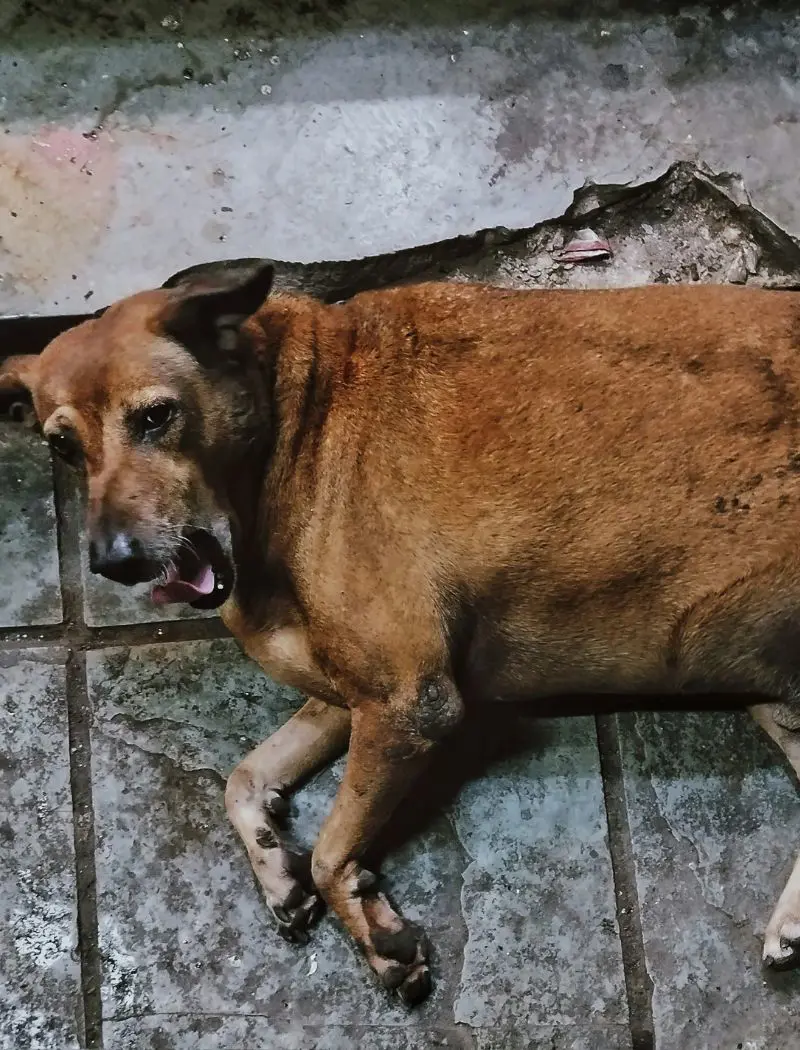17 Causes Of Gagging In Dogs

Gagging in dogs is a reflex action where a dog makes an unwilling effort to clear its throat or upper airway. This action is identified by a repetitive marked noise that resembles a gagging sound.
It often involves the dog widening its neck, making a gagging noise, or even producing foam or mucus. It is frequently distinguished by an effort to cough or vomit, but without producing anything. Here are 17 causes of gagging in dogs:
1. Foreign Objects
A foreign body stuck in the throat of a dog can cause serious pain and health risks. They may show signs such as continuous gagging.
Dogs may also show distress through restlessness and pacing. They can eat objects such as toys, bones, or sticks which may cause difficulty in breathing.
2. Kennel Cough

Kennel cough is a common respiratory infection in dogs noticed by a constant and harsh cough. This is usually caused due to viruses and bacteria.
Dogs with this condition have a dry cough followed by gagging due to the reflex. Other signs include sneezing and mild fever.
The condition can be more severe in puppies, elderly dogs, and those with health issues. It is highly contagious and can spread through suspended particles.
3. Reverse Sneezing
It is a common condition that is caused when they inhale rapidly through the nose. This results in a blowing sound which can sometimes resemble gagging.
It is triggered by dust, strong odors, or excitement. The dog may struggle to inhale or make unusual noises when suffering from this condition.
Dogs may also extend their neck and appear to be pulling air through the nose in short bursts. It is generally harmless and does not indicate serious issues.
4. Vomiting

Vomiting in dogs can sometimes be mistaken for gagging due to the similar physical actions involved. Throwing up is the forceful discharge of stomach contents through the mouth, typically accompanied by a normal gagging sound.
It is led up to by signs like drooling and lip-licking. Gagging is usually less forceful and may involve only the throat.
5. Heartworm Disese
Heartworm disease in dogs can cause retching when the infection affects the lungs. It can also damage the airways of a dog resulting in this gagging.
6. Pharyngitis

It can cause gagging in dogs due to irritation and uneasiness in the throat. This condition is a result of allergies or injuries.
The throat can become sensitive when it is swollen and can cause gagging as the body tries to clear the irritation.
7. Allergies
Allergies in dogs can result in gagging due to dust and mold. Gagging occurs when the dogs cough as the throat is swollen and sensitive.
8. Poisoning Or Toxicity

The body of a dog that eats toxic substances expels the harmful substances and leads to gulping. The body reacts by trying to throw out the poison when a dog eats unsafe substances like plants or chemicals.
Gagging is a common reaction that helps the dog to clear their throat from such harmful materials.
9. Gastritis
Dogs may gag due to gastritis as it produces stiffness and nausea. This can happen because of many reasons like eating spoiled food or stress.
The irritation can trigger a dog's gag reflex of a dog as they clear the irritation. This can be followed by vomiting and loss of appetite.
10. Surgical Complications

Post-surgical difficulties can also cause gagging in dogs if the surgery involves the throat or nearby structures.
The residual effects from anesthesia can irritate the throat and cause gagging. Infections after surgery can also lead to irritation and gagging.
11. Heart Problem
This can cause gagging in dogs when it leads to conditions that affect the respiratory system. The irritation in the respiratory tract can also trigger cough and gag reflex in dogs.
12. Behavioral Causes

Stress or anxiety in dogs can sometimes lead to gagging. Their body may react to stressful situations such as changes in the environment or separation anxiety.
They may gasp in such stressful situations which can irritate their throat and force them to gag.
13. Obesity
An obese dog is more likely to gag as its weight puts pressure on the throat. The fat can gather around their chest and apply pressure on their throat and stomach.
This pressure can disrupt their normal digestion and lead to irritation and gagging. An overweight dog may also face difficulty breathing which triggers retching.
14. Bloat

Bloating can cause retching as it puts pressure which makes it difficult for the dog to breathe. The dogs gag as they try to relieve the discomfort which may be caused due to the pressure on the stomach.
15. Tonsillitis
Dogs with this issue may gag as it creates irritation and soreness in the throat. The tonsils can also become inflamed.
This causes pain and a feeling of obstruction in the throat. This can trigger the gag reflex as they try to reduce the uneasiness.
16. Heatstroke

Heatstroke in dogs happens when their body temperature rises very high. The dog may try to cool down by panting heavily which can irritate their windpipe.
They may also drool excessively, which can lead to gagging as they try to clear their neck.
17. Stress
A stressed dog breathes more rapidly and causes dry throat irritation. This can cause them to cough or retch.
Muscle tension can also make it harder for the dog to swallow properly. They may also suffer from nausea and intense fear or pain.
Conditions such as separation anxiety in dogs may stress them and cause them to gag as part of a physical response to overwhelming situations.
Top Lists









